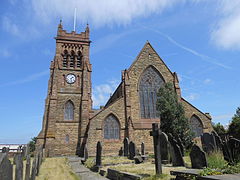Garston, Liverpool
| Garston | |
|---|---|
 St Michael's Church, Garston |
|
| Garston shown within Merseyside | |
| OS grid reference | SJ405842 |
| Metropolitan borough | |
| Metropolitan county | |
| Region | |
| Country | England |
| Sovereign state | United Kingdom |
| Post town | LIVERPOOL |
| Postcode district | L19 |
| Dialling code | 0151 |
| Police | Merseyside |
| Fire | Merseyside |
| Ambulance | North West |
| EU Parliament | North West England |
| UK Parliament | |
Garston is a district of Liverpool, England. Historically in Lancashire, it is bordered by Aigburth, Grassendale, Allerton and Speke.
Gaerstun, meaning 'grazing settlement' or 'grazing farm' in Old English, is one possible root of the name.
Garston as a name of a place may have its etymology informed by both Old English and Norse. The area that Garston was part of during the Viking Danelaw period would have been influenced by Norse speech. When Vikings settled they would sometimes change names because of speech difficulties. For example, the Saxon name for the city Eoforwic was changed to Jorvik. Shelton, was altered to Skelton, though the old English of 'ton' meaning settlement was retained attesting to the development of language over time.
Gar', from Old English (spear, dart, javelin, shaft, arrow, weapon) from Norwegian and Icelandic (spear) and Old Norse geirr (spear, arrow), may suggest that the name of Garston is a combination of Viking and Old English. A name possibly meaning the place where spears or arrows where made. In the Anglo Saxon period the forests belong to landowners and their subjects. It wasn't until the coming of William in 1066 that the 'Forest Law' was introduced which claimed woodland as the hunting grounds for kings. Woodland covered approximately 15% of England in 1086 (this had dwindled to just 5.3% in 1905).
Interestingly neither of these names may be exclusive and whilst they may have a different etymological ancestry they may simply because of the way language develops have a common history. The etymology of 'garden' is the same as yard and garth and derives from the Old English 'geard', meaning enclosure or hedge. So a hedged enclosure is the exact definition of a garden just as it is of a field.
Geardton (Old English field) or Geirrton (Old Norse spear) or Garton (Old English spear,weapon), all omit the S. S is used in Modern English to suggest plural and possessive. Nouns, noun phrases and some pronouns generally form a possessive with the suffix 's'. This form, is sometimes called the Saxon genitive, reflecting the suffix's derivation from a genitive case ending in Old English (Anglo-Saxon) (actually a Clitic).
This suggests at least two possible roots. Firstly one based on grazing as not geographically specific, unlikely to be fenced in, within the periods we are dealing with and secondly one based on specific activity or activities at a given point in a general location spear or arrow or weapon making, which is linked to a settlement, So a settlement where arrows were made is Geirr(s)ton or as we know it now Garston. The place of the arrows.
...
Wikipedia

